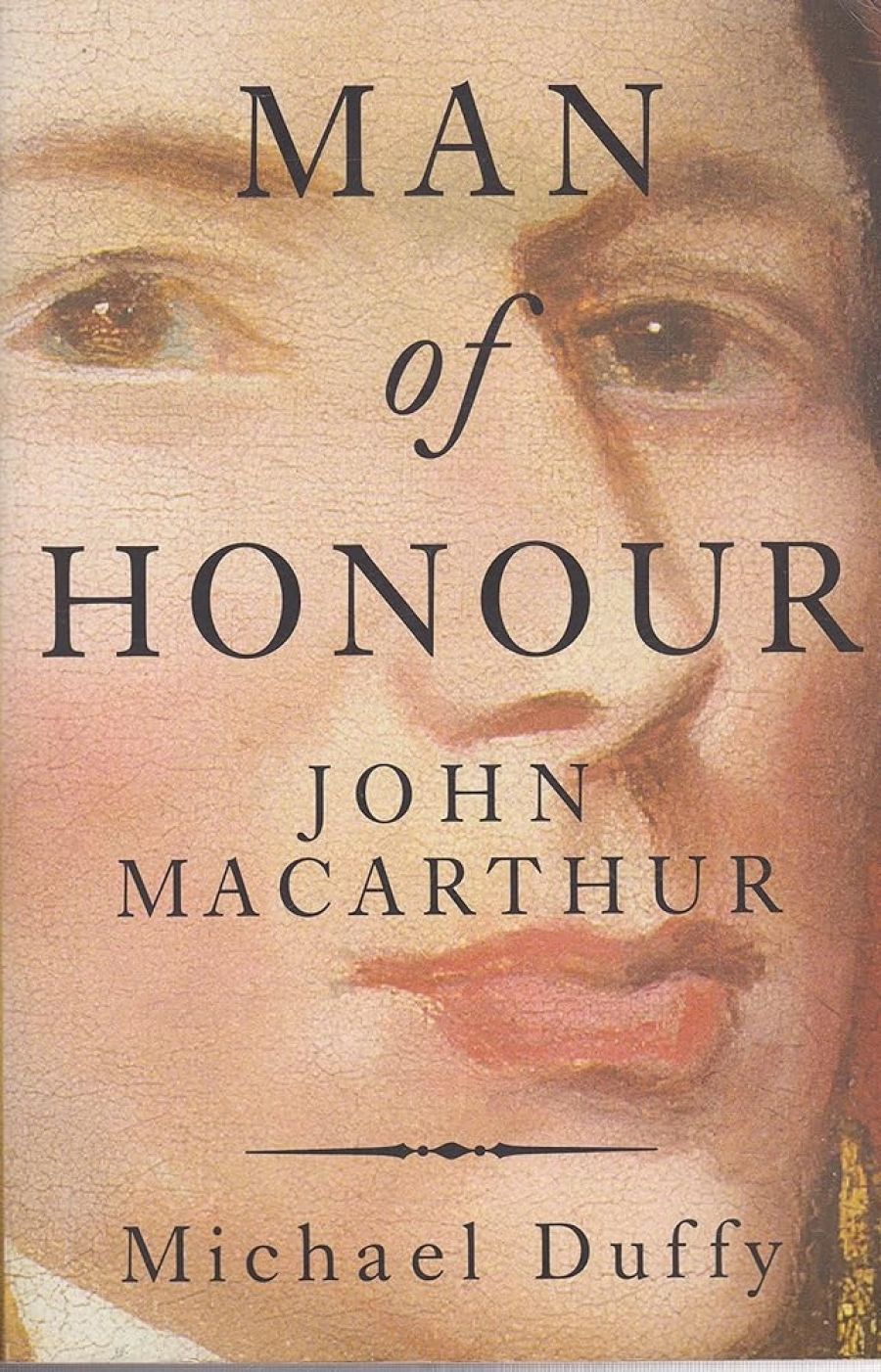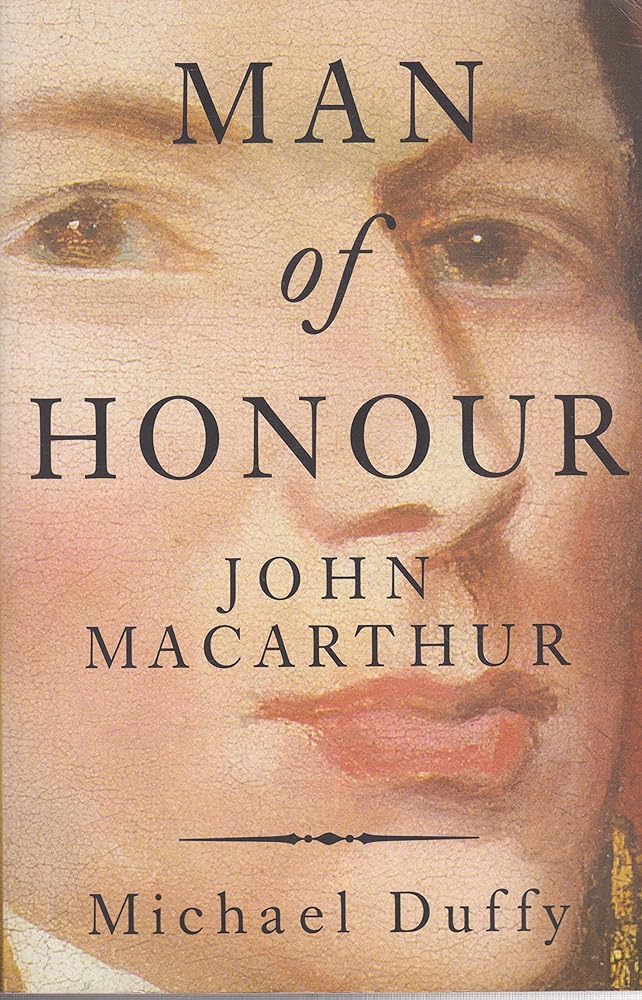
- Free Article: No
- Contents Category: Biography
- Review Article: Yes
- Article Title: Honour Games
- Online Only: No
- Custom Highlight Text:
As I read this book, serious questions were being asked about the honour of three governments: the British, the US and our own. Did they all lie so as to justify war against Iraq? Honour still matters, even at a time when the word is not used as often as it once was. Michael Duffy’s book about John Macarthur, one of the best-known inhabitants of colonial Australia, constructs him as a ‘man of honour’. It ought to be topical.
- Book 1 Title: Man of Honour
- Book 1 Subtitle: John Macarthur – duellist, rebel, Founding Father
- Book 1 Biblio: Macmillan, $35 pb, 376 pp
- Book 1 Cover Small (400 x 600):

- Book 1 Cover (800 x 1200):

Among Australian historians of the last fifty years, attitudes to John Macarthur have been a key to attitudes about a whole range of matters. If you admired Macarthur, it was a fair bet that you also thought of free enterprise – the pioneer spirit – as the driving force in Australian history, because Macarthur was one of its supreme exemplars. If you were against him, it was probably because you thought the creative power of government mattered most.
Something of this dichotomy still lingers. Duffy makes Macarthur a very large figure, ‘the most important person among [Australia’s] founders’, especially because he was a wool pioneer and leading trader. And yet, it’s doubtful whether the man himself would have understood this very twentieth-century tension between free enterprise and government power. Macarthur believed that imaginative government underpinned imaginative enterprise. Also, for him, rich men were, in important ways, part of government. These aren’t points that come out much in Duffy’s book, partly because he has little to say about his subject as a thinking man. That’s a pity because, for Macarthur, the uses of authority were matters of honour.
Duffy sees Macarthur’s ideas about honour as the ideas of a man on the make – a man sensitive about his status as an officer and a gentleman. This is not a new idea, but it’s an important one, and it is certainly one worth writing a book about. Duffy does us a favour, too, by saying nothing about snobbery and social climbing. He takes it for granted that Macarthur wanted to get on in the world and that he happened to be good at it.
Honour is a wonderfully rich and complex subject. Usually understood as a matter of grace – you either have it or you don’t – it’s intriguing to think of honour as a carefully crafted commodity, as a means and symbol of success. Duffy might have set out the possibility more clearly and explored it more deeply, but it seems to be fundamental to his book. And yet, in spite of thinking of Macarthur as an entrepreneur, Duffy does not chase up the connection between honour and commerce. Just as the foundations of commercial law were being laid in Britain at this time, so the complexities of world-wide trust among merchants were being worked out. Macarthur’s status in New South Wales depended very much on the rock-solid credit he had in Britain, at least from 1804. He chose highly respectable agents and bankers in London, and he made himself wholly trusted by them. This, perhaps more than anything, made him a man of honour in Australia. He was honest to the core – when it suited him. This deep self-consciousness, this self-dramatisation from top to bottom, makes him a profoundly interesting figure. His personality was typical of an age of revolution, a self-conscious, self-made age, when the world changed places with its own reflection.
Duffy also takes it for granted, unlike many earlier historians, that the ideas about honour that Macarthur brought with him to Australia were not a quaint throwback to an earlier age. They were necessary, he says, at a time when public order was fluid and uncertain, and they were especially necessary in the unformed circumstances of early New South Wales. Men of rank and property were hard for any government to manage, and it was crucial for them to have good methods of order among themselves. Duffy comes back over and over again to the fighting of duels as the ultimate method of deciding right and wrong among gentlemen, and as the proof and guarantee of honour. Maybe, once more, he could have taken this idea further. The honour of gentlemen was part of the machinery of nineteenth-century global power. It was a type of Freemasonry, a means of universal brotherhood. Wherever a man was, if he could claim to be a gentleman, he knew how to deal with others of his kind, a very handy thing, especially when the power of government was nowhere to be seen. A gentleman’s honour was strangely convertible, from something intimate, local and feudal to something very expansive indeed.
Honour was a means of civilising the power of men. It was an aspect of patriarchy or fratriarchy. Duffy is not a connoisseur of gender theory, but only a little theory is needed to see that men carried ideas about duelling and so forth over to matters of government. When men used authority, they pretended, at least, to do so in honourable ways. Duffy wonders about the ‘uncharacteristic’ violence of Governor Phillip’s response to the murder by Aborigines of his gamekeeper, John McIntyre. Why wonder in a book about men of honour? Why wonder at a moment when the honour of the US is being vindicated by its soldiers in Afghanistan and Iraq?(Maybe thorough gentlemen do not lie in order to get a better swipe at the enemy.) Just as a gentleman’s dignity might be affirmed, in some circumstances, by his hitting out, so the dignity of the king and his representatives was to be proclaimed to the world in the same way. The honour of every man in authority depended on his being able to stand by his dependants, to feed them, to protect them and to avenge them. This is what Phillip did in McIntyre’s case.
The good thing about this book is the questions it raises. The main disappointment is that it does not talk about honour in large enough terms. Honour was also mixed up with humanitarianism, one of the great movements of Macarthur’s day, but it was an open question as to how far active compassion ought to extend beyond one’s own dependants. As Duffy says, Macarthur and his wife were unconcerned about the misery of the female convicts who travelled with them from England on board the Neptune. He does not add that, in looking after his own convict servants, this gentleman was everything that could be desired. Macarthur was utterly reliable as an employer, and the loyalty he commanded among the men and women who worked for him was part of the secret of his success on the land. His credit with those who depended on him was just as secure as his credit with his London agents. Honour paid him well.
Duffy does not believe the testimony of Macarthur’s son James when he says that his father was ‘loth to enter into a quarrel’, however ‘bold and uncompromising’ when he did. But surely this was true. Macarthur was a man of peace, a good friend, a good master, a family man, who nevertheless shot to kill. There is a wonderful enigma here. In those days, honour embraced both compassion and uncompromising violence. The subject needs more thought, especially as it lies still at the root of civilisation.


Comments powered by CComment